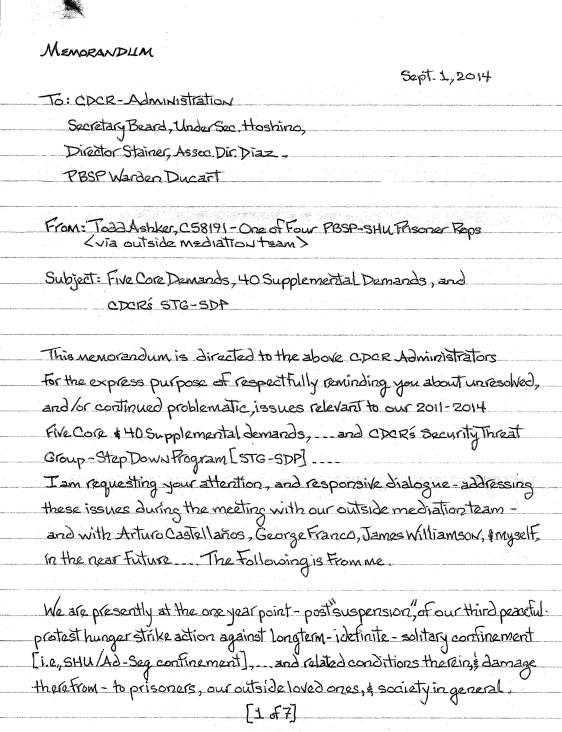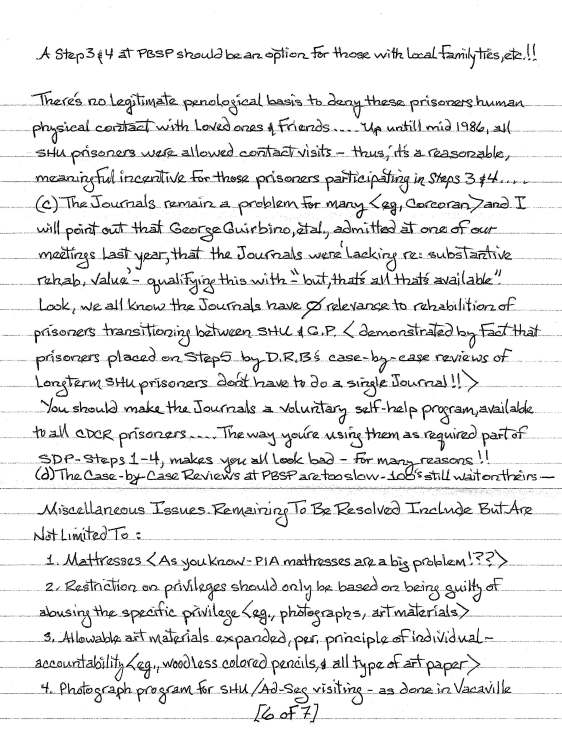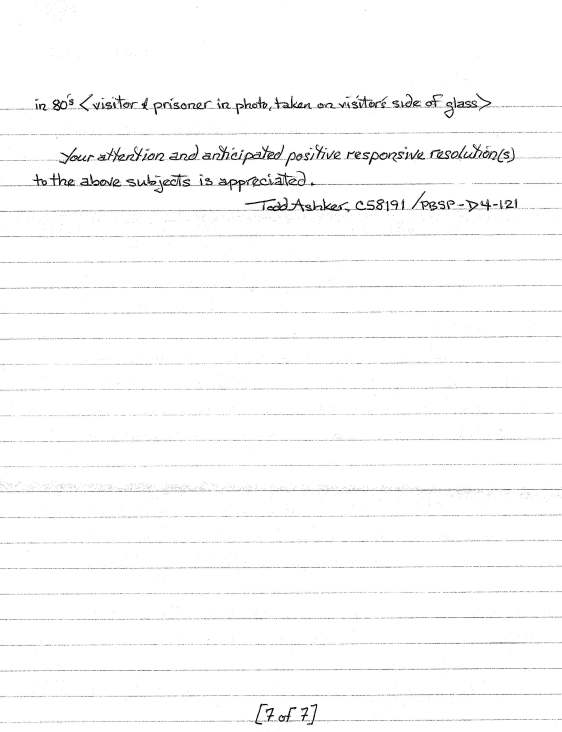March 29, 2015, in: SF Bay View
by Prisoner Human Rights Movement Local Council
Open letter to senior officials at CDCr headquarters:
We are sharing our express concerns as the CCI Prisoner Human Rights Movement Local Council – Sitawa Nantambu Jamaa (Dewberry), Danny Troxell, Antonio Villagrana and George Ruiz – concerning the non-functional operation of Steps 1 through 4 and how we as SHU SDP (Step Down Program) prisoners are being denied our federal and state constitutional rights to equal protection and substantive and procedural due process. This is the gist of the message presented to all CDCr and CCI top officials at CDCr headquarters on Feb. 9, 2015, by the CCI facilitator.
Listen up, America: California does torture and cause great harm to California prisoners – i.e., citizens.
This is a summary of the thought-provoking message to Gov. Jerry Brown and his personally appointed CDCr Secretary Jeffrey Beard and their subordinates, including senior CDCr officials 1) G. Giurbino, 2) S. Hubbard, 3) M. Hoshino, 4) M. Stainer, 5) R. Diaz, 6) M. Ruff, 7) K. Harrington, 8) L. Payton, 9) K. Allison, 10) T. Rothschild and 11) D. Herndon, who are the decision makers over 100,000 prisoners throughout CDCr and those of us held at CCI (Tehachapi). Many of CDCr’s employees are equally applying their bias, discrimination, racist behavior and torturous tactics against prisoners labeled as members or affiliates of a Security Threat Group (STG) or gang and SDP prisoners daily.
There is systematic corruption which has been instituted by the new regulations on STGs and the SDP Steps 1 through 5, and the public – i.e. all California citizens – should be discontented with our elected officials who have allocated to the state $9 billion to torture us, to discriminate against us and to violate prisoners’ constitutional rights with taxpayers’ money.
California taxpaying citizens: You are obligated to fight against the legalized human torture you are paying for.
These local CDCr subordinates, such as those at CCI (Tehachapi) prison, have been using their staff’s racist, biased and discriminatory cultural practices to deny all prisoners their fundamental rights under the CCR Title 15, the California Constitution, the U.S. Constitution and the International Human Rights Law. We prisoners are being violated by these specific custody employees and medical employees: 1) Kim Holland (warden), 2) Dr. H. Tate, 3) W. Sullivan (CDW), 4) B. Snider (STG/SDP-CCII), 5) R. Mayo (captain), 6) J. Gutierrez (AW), 7) J. Edward (visiting room staff), 8) V. Ybarra (CC-I), 9) Matzen (captain), 10) Hernandez (SDP-CC-II), 11) K. Campball (sergeant), 12) R. Cole (sergeant), 13) Cable (property officer), 14) Landau (imam), 15) Davis (chaplain), 16) J. Tyree (IGI lieutenant), 17) E. Atencio (mailroom personnel), 18) Whitson (sergeant)(A), 19) J. Leon (correctional officer) and 20) Nathaniel (correctional officer) have all committed acts of punishment and harassment toward CCI prisoners.
Every citizen in the state of California should independently investigate all CDCr and CCI named employees and share information about the corrupt employees with California taxpayers – now! now! now!
We seek corrective measures to take place immediately in Steps 1, 2, 3, 4 and 5
The sham Step Down Program has been doomed from the start, governed by underground policies. On Oct. 12, 2012, CDCr enacted a pilot program in which it wrote open-ended policies that govern the program function and at the same time allow the policies to be manipulated at all levels of their administration as they see fit for their own benefit with its DRB (Departmental Review Board) process. Step placement is so arbitrary that the time period of advancement from one step to the next step can easily amount to regression back to a lower step.
In the regulations issued Oct. 17, 2015, of the Step Down Program Notice of Expectations, Step 1 and Step 2 prisoners can complete each step in one year but may be accelerated by ICC at the 180 day review; and Step 3, Step 4 and Step 5 prisoners can complete each step in one year – with no acceleration through these steps. Although the policy is written with specific and clear language, it demonstrates that CDCr has enacted policies of substantive due process. These underground policies allow Step 1 and Step 2 prisoners the benefit of an accelerated advancement from one step to the next in 90 days with three completed journals – Step 1 to Step 2 and Step 2 to Step 3.
These substantive due process policies have been implemented and extended to hundreds of Step 1 and Step 2 prisoners throughout CDCr since Oct. 12, 2012, utilizing CDCr standardization of all SHUs and Administrative Segregation units (AdSegs), which gives the appearance that their Step Down Program is up and functioning and prisoners are being advanced from one step to the next, while in truth only Step 1 and 2 prisoners are being accelerated and advanced to the next step in 90 days of their required 12 months.
This same advancement incentive is not being extended to Step 3, 4 and 5 prisoners, thereby denying them their substantive due process and equal protection rights. At this time, all Step 3, 4 and 5 prisoners are being forced to complete all 12 months of each step along with four completed journals, and they are receiving no incentive of accelerated advancement to the next step in 90 days for their participation. CDCr Step 3 prisoners are being punished and mistreated. Psychological warfare is being directed at them.
It is clear that CDCr is not applying its policies equally nor extending equal substantive due process to all three SDP prisoners. Furthermore, Step 1 and Step 2 prisoners are being rewarded for participation in the lowest steps of the program while Step 3, 4 and 5 prisoners are being punished for their participation in the higher, more advanced steps of the program. Step 3, 4 and 5 prisoners are not being extended any incentives for their ongoing good behavior and participation in these three steps.
In essence, CDCr has instituted a policy allowing Step 1 and 2 prisoners across the state to actually do a quarter of the required SDP one year. Yes, Secretary Beard of CDCr has approved 90 days and three journals per Step 1 and 2.
The SDP needs to be afford quarter-time credits to all prisoners in Steps 1 through 5 and especially Steps 3, 4 and 5 prisoners. Being that CDCr has been running the Step Down Program since Oct. 12, 2012 – for over two years – it is a clear violation of Step 3, 4 and 5 prisoners’ equal protection rights under the U.S. Constitution.
Secretary of CDCr J. Beard has sanctioned these procedures, and they must be corrected to provide to all Step 3, 4 and 5 prisoners the same treatment as Steps 1 and 2 now receive, in order to give them substantive due process forthwith.
Corrective measures for SDP Step 3, 4 and 5 prisoners
- All SDP Step 3 prisoners shall be accelerated and advanced forthwith to Step 4 after completing a 90-day period.
- All SDP Step 4 prisoners shall be accelerated and advanced to a 180-designed (high security) prison after completing a 90-day period, which is one quarter of the required 12-month time period, forthwith.
- All SDP Step 5 prisoners shall be accelerated and advanced to a 270 designed (lower security) prison after completing a 90-day period, which is one quarter of the 12-month observation time period, forthwith.
These SDP Steps 3, 4 and 5 privilege groups have been denied their equal protection and substantive due process rights under the California Constitution and the U.S. Constitution. CDCr must accelerate and advance prisoners in all above-mentioned steps.
Visiting
In the spirit of standardizing all CDCr SHUs and AdSegs, we must consider visiting, an unresolved issue of concern for years here at CCI. The entire visiting scheduling and process is conducted unprofessionally and causes all types of unnecessary problems for our visitors who are citizens.
CCI visiting operators have been forcing our visitors to be placed on hold for two to four hours just to schedule a weekend visit. CCI visiting officers are unprofessional and intentionally vindictive. It should not take more than five minutes to schedule a visiting date.
All allowable visiting time for SHUs and AdSeg prisoners fall under a statewide standardized visiting time period of two and a half hours per scheduled visit for Saturday and Sunday – not just for the one day and one hour visit per weekend as CCI has been doing for over a decade. All prisoners should be afforded two visiting days per weekend, as is done at all other SHU and AdSeg prisons in the state, except for CCI.
TV stations
All prisons and institutions within CDCr are responsible for providing all prisoners an adequate and functional TV system. Now CCI Warden Kim Holland is fully aware that the CCI TV system is inadequate and it has been so stated to him by the local court, by the granting of 602 appeals. CCI is not at present a part of any cable system or satellite dish system, which is the sole reason why prisoners have been receiving inadequate TV reception. Holland and staff have been for years denying prisoners Charter Cable or Direct TV and are currently mishandling and misappropriating the allocated funds for the CCI TV service and education departments.
From the Prisoner Human Rights Movement! In struggle!
The CCI Prisoner Human Rights Movement Local Council can be reached via Sitawa Nantambu Jamaa (Dewberry), C-35671, 4B-7C-209, P.O. Box 1906, Tehachapi CA 93581.
Alternatively, you can send an email with your questions and/or support via email to:
Prisonerhumanrightsmovement [at] gmail.com
This will be forwarded to Sitawa via snail mail since he has not computer, cellphone or internet connection.
© Sitawa Nantambu Jamaa







You must be logged in to post a comment.